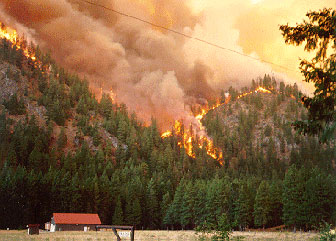Wildfires are linked to Atlantic Ocean temperatures
Wildfires are linked to Atlantic Ocean temperatures
mongabay.com
December 25, 2006
Scientists have linked the incidence of wildfires in the Western United States to Atlantic Ocean temperatures.
Analyzing “fire scars” on tree rings of some 4,700 tree stumps dating back 450 years a team of researchers led by Thomas Kitzberger of the Universidad Nacional del Comahue in Argentina suggest that the Western United States could be in for increased wildfire activity due to cyclical variations in Atlantic Ocean temperatures.
 Image courtesy of the Washington States Department of Natural Resources |
The study, published in the Dec. 26 issue of the Proceedings of the National Academy of Sciences (PNAS), says that Western fires are more frequent during the warm phases of the Atlantic Multidecadal Oscillation (AMO), a periodic warming and cooling cycle in the Atlantic, especially when combined with certain phases of El Niño and the Pacific Decadal Oscillation (PDO), another cyclical warming and cooling phenomenon.
“A current warming trend in AMO suggests that we may expect an increase in widespread, synchronous fires across the western U.S. in coming decades,” wrote the researchers.
“This trend of warmer sea-surface temperatures in the North Atlantic appears to be correlated with dry spells we have seen in the West since the late 1990s,” said Thomas Veblen, co-author and a geography professor at the University of Colorado at Boulder. “If the trend continues for the next 60 years or so as it has in the past, the degree of fire occurrence in the West could be unprecedented compared to anything in recent memory.”
“The key issue is that the Atlantic Multi-Decadal Oscillation persists on time scales of 60 to 80 years, compared to just one year or a few years for El Niño,” he said.
Research released earlier this year found a marked increase in the frequency and intensity of forest fires in the Western United States during the 1980s. That study said that the change was linked to a pattern of earlier springs and warmer summers — a development that other scientists say could be the result of climate change.
“Contingent Pacific—Atlantic Ocean influence on multicentury wildfire synchrony over western North America” by Thomas Kitzberger, Peter M. Brown, Emily K. Heyerdahl, Thomas W. Swetnam, and Thomas T. Veblen.
This article is based on a news release from PLoS Medicine.